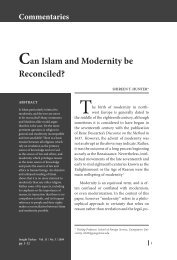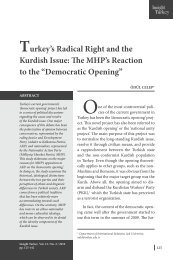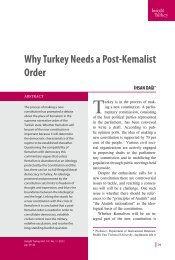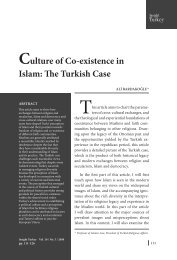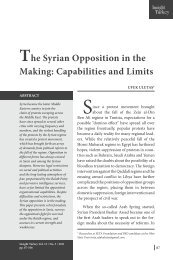Black Turks, White Turks: On the Three ... - Insight Turkey
Black Turks, White Turks: On the Three ... - Insight Turkey
Black Turks, White Turks: On the Three ... - Insight Turkey
You also want an ePaper? Increase the reach of your titles
YUMPU automatically turns print PDFs into web optimized ePapers that Google loves.
MÜCAHİT BİLİCİ<br />
view of “integration” is ra<strong>the</strong>r too simplistic. Such an analysis fails to question <strong>the</strong><br />
centrality of <strong>the</strong> center: it gives <strong>the</strong> impression that <strong>the</strong> incumbents of <strong>the</strong> center<br />
have arrived <strong>the</strong>re through some achievement and effort, and that <strong>the</strong> periphery is<br />
under some teleological obligation to try to join with <strong>the</strong>m under normative conditions<br />
that Shils calls <strong>the</strong> “central value system.” Even in Western democracies,<br />
where such “central value systems” are relatively broad, <strong>the</strong>re has been a tendency<br />
towards multiculturalism as a way of acknowledging <strong>the</strong> multiplicity of values. In<br />
countries like <strong>Turkey</strong>, what has become <strong>the</strong> “central value system” of <strong>the</strong> society is<br />
still far from representative or inclusive. Authoritarian efforts to engineer a new<br />
society from above led to a center that has remained in constant opposition to <strong>the</strong><br />
periphery, creating two <strong>Turkey</strong>s at odds with one ano<strong>the</strong>r.<br />
<strong>On</strong>ce we begin to see <strong>the</strong> relationship between <strong>the</strong> center and <strong>the</strong> periphery in<br />
<strong>the</strong>se terms, we can no longer think of its vernacular reflection, <strong>the</strong> <strong>White</strong> <strong>Turks</strong>/<br />
<strong>Black</strong> <strong>Turks</strong> distinction, in terms of income level, economic power or, most misleadingly,<br />
<strong>the</strong> “degree of modernization.” The relationship between <strong>the</strong> two <strong>Turkey</strong>s<br />
has been one of power relations. It can best be grasped as a long-running<br />
competition, often obscured by <strong>the</strong> domestic discourse of national homogeneity<br />
and by such imported templates as “political Islam versus <strong>the</strong> secular state.” This<br />
competition occasionally flares up into political crises, <strong>the</strong> most recent example of<br />
which is <strong>the</strong> ongoing standoff between <strong>the</strong> Justice and Development Party (AKP,<br />
Adalet ve Kalkınma Partisi) and <strong>the</strong> Kemalist bureaucratic elite. What follows is a<br />
discussion of <strong>the</strong> historical and cultural conditions that contributed to <strong>the</strong> bifurcated<br />
<strong>Turkey</strong> we see today.<br />
Being a Minority in <strong>Turkey</strong><br />
As part of <strong>the</strong> European Union candidacy requirements, in <strong>the</strong> last couple of<br />
years <strong>the</strong> Turkish government has engaged in a series of constitutional and legislative<br />
reforms, and has lessened <strong>the</strong> restrictions on minority languages and on<br />
<strong>the</strong> property rights of non-Muslim foundations. This trend towards change and<br />
democratization was so promising that in October 2004, <strong>the</strong> prime minister’s Advisory<br />
Committee on Human Rights sponsored a “Report on Minority Rights and<br />
Cultural Rights.” It was prepared by a committee and co-authored by Baskin Oran<br />
and Haluk Kaboglu. The report criticized traditional state policies towards minority<br />
identities, demonstrated how <strong>the</strong> term “Turk” was simultaneously a racial/<br />
ethnic and a constitutional category, and recommended greater accommodation<br />
of Kurdish and Alevi identities as well as protection of <strong>the</strong> rights of non-Muslim<br />
minorities.<br />
24



